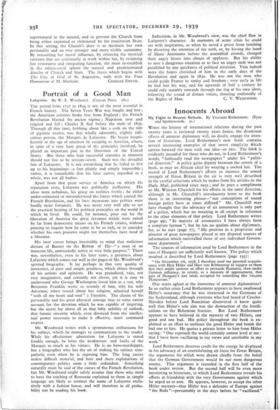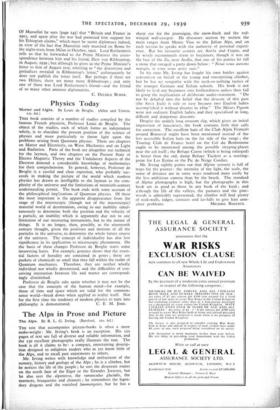Innocents Abroad
My Fight to Rearm Britain. By Viscount Rothermere. (Eyre and Spottiswoode. is.) WHEN the history of international relations during the past
twenty years is reviewed twenty years hence, the disastrous effects of amateur diplomacy will, no doubt, engage the atten- tion of historians. Lord Rothermere's new book contains several interesting examples of that sweet simplicity which
carries forward the-man with one idea—or two. The bdok is evidently intended for those who do not, in Lord Rothermere's
words, " habitually read the newspapers " under his " cal direction." A policy gains dignity between the covers of a book, as may an African chief by wearing a cocked hat. The record of Lord Rothermere's efforts to increase the armed strength of Great Britain in the air is very well described in the careful selections which he makes from his articles in the
Daily Mail, published since 1933 ; and he pays a compliment to Mr. Winston Churchill for his efforts in the same direction,
although in Mr. Churchill's introductory letter to the book there is an interesting phrase—" our conceptions of sound foreign policy have at times differed." Mr. Churchill may have thought that the advocacy of air armaments is only part of a policy, which has no meaning at all except in reference to the other elements of that policy. Lord Rothermere writes (page 99), " In matters of aeronautics I have alWays been a compete layman "; but he has no qualms about diplomacy, for, as he says (page 77), " My position as a proprietor and director of great newspapers placed at my disposal sources of information which outrivalled those of any individual Govern- ment department."
The sources of information used by Lord Rothermere in the case of Hungary are sufficiently well known. The policy which resulted is described by Lord Rothermere (page 155): " On November 5th, 1938, I therefore used my personal acquain- tance with Herr Hitler and Herr von Ribbentrop to suggest to them that they might sponsor an effort to persuade Rumania, then [under German influence, to return, as a measure of appeasement, that part of Hungary's lost lands occupied by something like 700,000 Hungarians."
One stares aghast at the innocence of amateur diplomatists! In an earlier crisis Lord Rothermere appears to have swallowed
Hitler's assurance that he was interested in the Germans of the Sudetenland, although everyone who had heard of Czecho- Slovakia before Lord Runciman discovered it knew quite well that Hitler's sole aim was the destruction of the fortifi- cations on the Bohemian frontier. But Lord Rothermere appears to have believed in the mystery of two Hitlers, one good and one bad. His policy throughout the book is ex- plained as an effort to embrace the good Hitler and bomb the bad one to bits. He quotes a private letter to him from Hitler saying : " One reproach the world certainly cannot level at me : that I have been vacillating in my views and unreliable in my work."
Lord Rothermere deserves credit for the energy he displayed in his advocacy of an overwhelming air force for Great Britain,
the arguments for which were drawn chiefly from the belief that the German Government would be our most dangerous enemy. This argument is recorded in the first half of the book under review. But the second half will be even more interesting to historians, in which Lord Rothermere reveals his efforts at friendship with the very Government against which he urged us to arm. He appears, however, to accept the other Hitler mystery—that Hitler was a defender of Europe against " the Reds "—presumably in the days before he " vacillated."
Of Mussolini he says (page 145) that " Britain and France in 1915, and again after the war had promised him support for his Ethiopian claims," which must be secret diplomacy indeed, in view of the fact that Mussolini only marched on Rome by the night-train from Milan in October, 1922. Lord Rothermere tells us that he forwarded to the Prime Minister the corre- spondence between him and his friend, Herr von Ribbentrop, in August, 1939 ; but although he gives us the Prime Minister's letter to him of August 21st, referring to " the distortions and prejudices revealed in Ribbentrop's letter," unfortunately he does not publish the letter itself. But perhaps if there are two Hiders, there are many more Ribbentrops ; and only one of these was Lord Rothermere's friend—and the friend of so many other amateur diplomatists.
C. DELISLE Bums.































 Previous page
Previous page